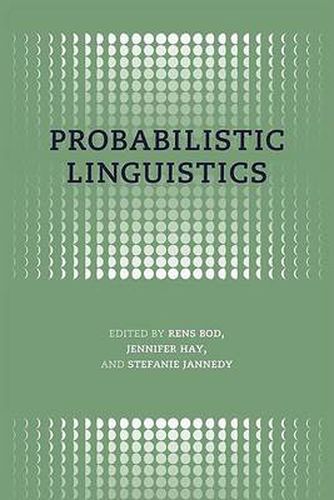Readings Newsletter
Become a Readings Member to make your shopping experience even easier.
Sign in or sign up for free!
You’re not far away from qualifying for FREE standard shipping within Australia
You’ve qualified for FREE standard shipping within Australia
The cart is loading…






For the past forty years, linguistics has been dominated by the idea that language is categorical and linguistic competence discrete. It has become increasingly clear, however, that many levels of representation, from phonemes to sentence structure, show probabilistic properties, as does the language faculty. Probabilistic linguistics conceptualizes categories as distributions and views knowledge of language not as a minimal set of categorical constraints but as a set of gradient rules that may be characterized by a statistical distribution. Whereas categorical approaches focus on the endpoints of distributions of linguistic phenomena, probabilistic approaches focus on the gradient middle ground. Probabilistic linguistics integrates all the progress made by linguistics thus far with a probabilistic perspective.This book presents a comprehensive introduction to probabilistic approaches to linguistic inquiry. It covers the application of probabilistic techniques to phonology, morphology, semantics, syntax, language acquisition, psycholinguistics, historical linguistics, and sociolinguistics. It also includes a tutorial on elementary probability theory and probabilistic grammars.
$9.00 standard shipping within Australia
FREE standard shipping within Australia for orders over $100.00
Express & International shipping calculated at checkout
For the past forty years, linguistics has been dominated by the idea that language is categorical and linguistic competence discrete. It has become increasingly clear, however, that many levels of representation, from phonemes to sentence structure, show probabilistic properties, as does the language faculty. Probabilistic linguistics conceptualizes categories as distributions and views knowledge of language not as a minimal set of categorical constraints but as a set of gradient rules that may be characterized by a statistical distribution. Whereas categorical approaches focus on the endpoints of distributions of linguistic phenomena, probabilistic approaches focus on the gradient middle ground. Probabilistic linguistics integrates all the progress made by linguistics thus far with a probabilistic perspective.This book presents a comprehensive introduction to probabilistic approaches to linguistic inquiry. It covers the application of probabilistic techniques to phonology, morphology, semantics, syntax, language acquisition, psycholinguistics, historical linguistics, and sociolinguistics. It also includes a tutorial on elementary probability theory and probabilistic grammars.